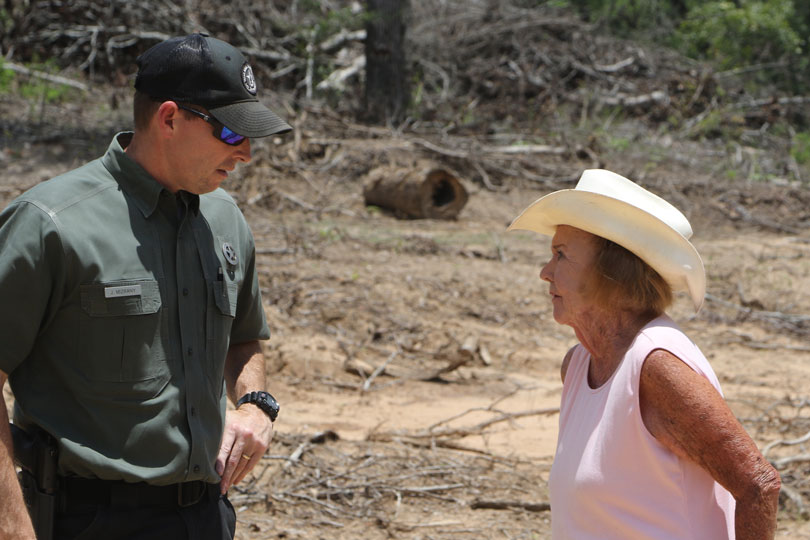By Jennifer Dorsett
Field Editor
On the surface, timber theft sounds like a made-up problem. But it happens often, Texas A&M Forest Service Investigator Josh Mizraney said.
Along with nine other full-time investigators, Mizraney is a Texas peace officer whose job is to enforce the Texas Natural Resource Code, including investigating any allegations of timber theft.
“There’s a variety of types of timber theft,” Mizraney said. “You have what we call unauthorized timber harvest, where an individual might steal from an absentee landowner. They may know no one lives there and cut the timber and sell it at the mill.”
Landowners who don’t live on the land or monitor it regularly may not discover their trees are gone for months or even years, he said. Those who harvest illegally may only harvest in the center of the property, so it looks fine from the road, or they may be harvesting on the next tract over and jump the fence and keep going.
“Then there’s the timber fraud aspect, which is almost a con game,” Mizraney said. “You have somebody knock on your door, offer to buy your timber. Seems like a trustworthy person, maybe has a false contract, and then the landowner doesn’t get paid.”
One Texas Farm Bureau member now knows how hard the investigators work after she had a recent brush with timber theft on her property.
Michaelene Baker lives outside Centerville on a sprawling, wooded ranch. Her family has raised cattle and horses on the same land for more than 75 years. Baker was born in the old farmhouse on the property, and although she moved away for college and her career, she moved back in 1998 to ranch full-time.
“I received a letter from an individual who was interested in buying my timber, and I was really impressed with the letter he sent me,” Baker said. “I called him, and he came over and said he felt like I had a lot of timber I could sell.”
The man who sent the letter played the role of a timber broker, similar to a landman for an oil and gas company. He brought along the timber company owner who would be purchasing Baker’s timber, and they worked out a contract.
“I was pretty pleased with everything,” Baker said. “But from there on, it kind of went downhill. By that, I mean that they came and started cutting the timber, but I saw no money coming in.”
The timber company had agreed to pay Baker a certain amount per ton of pulpwood and a higher amount per ton of logs. The contract stipulated payments were to be made weekly, but after a few weeks, Baker still had not received any payment from the company.
“As time went on, I realized that I didn’t have a good deal, because I never got any money for my timber, and the trucks had been going out for quite some time,” she said. “As a result of that, I terminated my contract, but I still had received no money. I called [the company owner] and suggested that he pay me. He said that he was going to send me a check, and it never came. He said that his secretary made a mistake, and they got the check back.”
The ensuing run-around left Baker feeling frustrated.
The subcontractor who harvested the timber suggested Baker call Texas A&M Forest Service. He had seen similar situations before, where a company promised a landowner certain terms but didn’t follow through.
He knew the Forest Service would be able to assist Baker in getting the money owed to her.
“They were at my house the next day,” she said of the Forest Service investigators. “Of course, the next day, guess what? I got a card from the owner, and in three days I got an overnight letter with my money. I was very pleased at how they did it. I found them to be highly knowledgeable and very, very effective.”
Mizraney said unfortunately, timber theft is not an uncommon situation.
“A lot of my job is making phone calls, tracking down guys who haven’t paid these people and recovering the money for the landowner and then, if need be, going to the district attorney with charges,” he said. “Most of the people in this industry are great people. They’re good, homegrown people. But there are definitely some bad apples out there, just like anything else.”


Thanks for a great article. We have had some experience with this also.
Thanks for publishing this article. Watch for timber cutting along property lines. They have a tendency when cutting to move onto and across lines. Mistake ??. Member of the Jasper ,Newton Co. Landowners assoc..I am a previous long time member & employee of the Texas Farm Bureau. Thanks Dale Nuckols, Waco, Tex.
Great article. So many people don’t know enough about timber. Someone can be conned easily, if they don’t know how much their timber is worth !